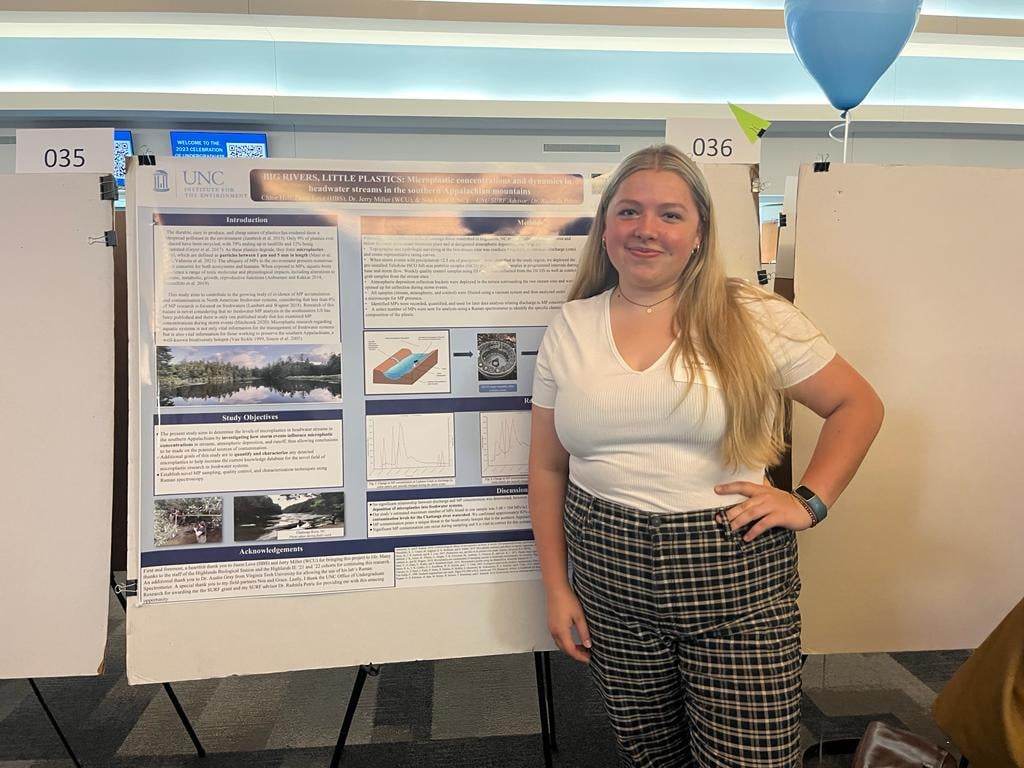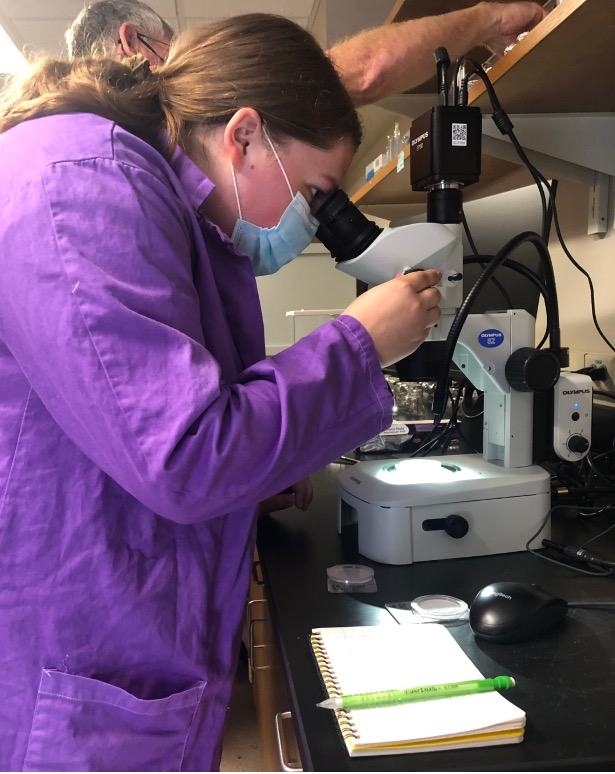SURF grant advances UNC microplastics research in western North Carolina
May 23, 2023
For Chloe Hall, receiving summer funding for her research meant she got to return to the place she loves—the Appalachian Mountains.
Hall is a junior at the University of North Carolina at Chapel Hill, majoring in environmental science. Last year, she received a Summer Undergraduate Research Fellowship (SURF) after applying with a research proposal to the Office of Undergraduate Research. She used this funding to continue her research that began in the fall of 2021 when she decided to spend the semester at the Highlands Field Site (HFS) in Highlands, North Carolina. The HFS is an experiential education opportunity created by UNC Institute for the Environment in partnership with the Environment, Ecology and Energy Program at UNC-Chapel Hill.
“I had an entirely online freshman year, so when the time came to register for my fall courses for sophomore year, I was really ready to find experiential, hands-on heavy learning,” said Hall. “I heard about the field site program that the E3P school has, and I thought about how amazing that opportunity would be.”
Hall said she began participating in research on microplastics during this semester at the field site when a professor presented the idea as a focus for the group’s capstone. She and her classmates then spent the semester working closely with Jason Love, a researcher and associate director of the Highlands Biological Station, where the HFS is located. Hall said their research investigates microplastic dynamics and concentrations in southern Appalachian watersheds.
“Microplastics are a very hot topic right now, but a lot of the research out there focuses on marine life and oceanic impacts; not a lot of the research looks at freshwater systems,” said Hall. “We had to build entirely new methods for sampling for these plastics in the water.”
Her goal was to determine if there are microplastics in local rivers while also finding any correlations between storm events and microplastic concentrations in these freshwater systems. She said these two research aspects are necessary because analyzing watersheds in the southern Appalachians has implications for the entire region.
“The southern Appalachian Mountains are very important for freshwater ecosystems because they kind of serve as the water towers of the Southeast,” said Hall. “Anything that travels into the water there travels hundreds of miles down and can create a domino effect.”
Microplastics can also have a variety of negative impacts on the ecosystem. Hall said microplastics threaten these watersheds because they can be toxic to microorganisms and organisms. These degraded plastics can travel into groundwater and drinking water as well.
“They are everywhere, and they can even impact reproductive functions in freshwater organisms,” said Hall. “Doing research up in the mountains where all of these watersheds start can help to identify the source of pollutants.”
Last summer, Hall worked on the Cullasaja River in western North Carolina. She collected water samples during storm events and then analyzing the samples to quantify any microplastics found. These samples help HFS researchers look for correlations between the number of microplastics in the water and the timing of precipitation.

“We’re trying to link microplastic concentrations to storm events to see if there’s some sort of relationship with atmospheric deposition and determine if there are microplastics in rainfall or if they’re coming directly into the river,” said Hall.
She said that her SURF funding allowed her to continue pursuing this research and her career goals.
“I think it wouldn’t be possible for me to continue this work without that funding, so it’s really helping me in every way possible,” said Hall. “Career-wise, I would like to continue in hydrologic research because of this project that I joined, and I’m sure that the experiences I have this summer will be foundational to whatever I do in the future.”
Hall presented her work at UNC’s 24th annual Celebration of Undergraduate Research earning Sustainable Carolina’s Excellence in Undergraduate Research top prize. Her first-place poster titled, “Big Rivers, Little Plastics: Microplastic Concentrations and Dynamics in Headwater Streams in the Southern Appalachian Mountains” was one of 400 submissions from all disciplines.
“Receiving the Sustainable Carolina award felt extremely validating and motivating in a number of ways,” Hall said. “To see that undergraduates can participate in meaningful research and be recognized for it was an amazing feeling. Additionally, to have the University recognize the significant research efforts being made through the environmental departments here and at the field sides was great news as well. I’m very thankful to have been selected for this award and for the consistent guidance and support I received from my mentors Jason Love and Rada Petric at HBS.”
Beyond her research, Hall said that her time at the HFS was an incredible experience. She grew up spending time outdoors, and she said that getting to learn out in the field was the perfect opportunity.
“I’d say my favorite part was just how seriously the professors took experiential learning,” said Hall. “It was the best possible location to go out and actually experience and look at the things we were learning about.”
Her mentor Rada Petric, an assistant professor at UNC-Chapel Hill and the director of the HFS, also encouraged Hall to continue pursuing her research goals. Hall said that Petric is a personal mentor for her and was the person who encouraged her to apply for the SURF funding.
“She’s just a very strong supporter of women in STEM and women in fieldwork in environmental science,” said Hall. “There has kind of been a precedent that fieldwork is a very male-dominated sector, and she’s definitely helping to change that.
“Overall, I would encourage everybody or anybody in the E3P school to go to a field site or get some form of hands-on field experience,” said Hall. “I’m excited to see where our research goes this summer.”
Hall is excited that microplastic research is ongoing at the Highlands Field Site and future classes also will get to participate in this research.
Story by Sarah Padyk
As an environment and science communication dual degree student, Sarah Padyk is working towards a B.S. in environmental science and an M.A. in media and communication. She originally got involved with IE as a Cleantech Corner intern, and she recently interned with The Nature Conservancy in North Carolina. After graduating with her master’s degree in 2023, Sarah plans to pursue a career in environmental communication with a focus on energy systems.
